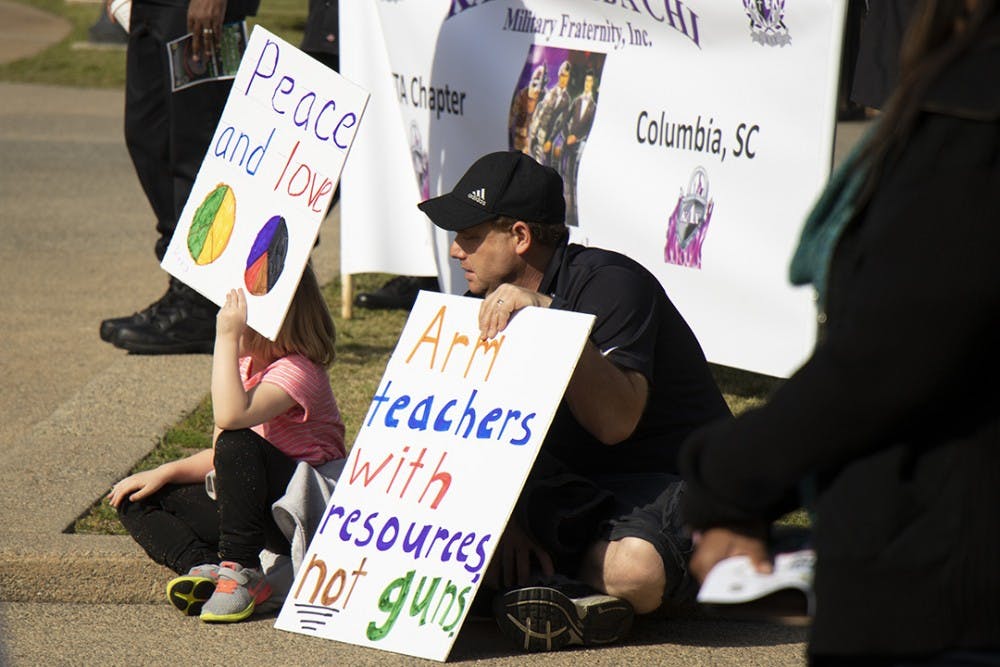The second annual March for Our Lives event at the South Carolina Statehouse in Columbia tackled the issue of South Carolina gun violence.
Under 100 attendees attended Saturday's event. Last year's event held about 3,000 people on the Statehouse grounds.
According to the Centers for Disease Control and Prevention (CDC), the 2017 firearm mortality rate in South Carolina was 17.7 per 100,000 deaths with 893 firearm-related deaths. This is higher than the U.S. firearm mortality rate of 12.2 per 100,000 deaths with 39,733 deaths across the U.S. in 2017.
March for Our Lives attendees came to the event for various reasons. Larraine Moses, a long-time resident of Columbia, felt compelled to attend the event after the youth group at Tree of Life Congregation, the Jewish synagogue to which Larraine Moses belongs, mentioned Saturday’s gathering.
“We woke up this morning and said, ‘We gotta go,'” Larraine Moses said, standing next to her husband Jeff Moses.
Larraine Moses said they have grandchildren in the Columbia area, but even if they didn’t, they would still be concerned about the current state of gun violence. Larraine Moses said she believes the rate of gun violence has been increasing. Jeff Moses said he felt connected to this push for change.
“Vietnam, the draft and all that, that was a serious moment for us, so we could relate to this movement that’s taking place.” Jeff Moses said.
Some attendees, such as Brittanee Roach, were drawn to the March for Our Lives rally due to a personal connection to the horrors of gun violence. Roach lost her sister to gun violence, and she said that experience personalized the importance of gun violence awareness.
“It doesn’t really hit you until it hits home. Hearing about people murdered in the news is different ‘til it’s actually someone that you know that’s been affected by it,” Roach said.
Roach said the importance of March for Our Lives lies in the remembrance of victims of gun violence and the living must work to enact change for those who are no longer here to do so.
“The family members, friends, anyone who knew them will fight for [victims’] voices.” Roach said.
Dr. Steph Lee, a pediatrician specializing in preventive medicine, was one of the rally's speakers. Lee spoke to represent the South Carolina chapter of the American Academy of Pediatrics, the public voice of pediatricians in the state. She emphasized the effects, both seen and unseen, that gun violence can have on the community.
“Gun violence is a public health problem. Tragedy has a domino effect on mental health,” Lee said. “This is why, also, gun violence requires a public solution in collaboration with community partners and all levels of government.”
Lee also spoke about unintentional gun violence, such as children accessing their parents’ guns at home. She said that the chance of unintentional injury or death due to a firearm decreases when guns are locked away and separated from ammunition.
Lee said that according to the latest South Carolina Department of Health and Environmental Control data, 39 children died due to firearms in 2017.
Additionally, Lee said a quarter of gun-related deaths are due to teenage suicides, emphasizing the need for mental health care.
In South Carolina, the rate of firearm-related suicides in 2016 was 9.9 per 100,000 deaths, which was also above the rate of that of the U.S., according to the CDC.
Marthe Williams, a mental health professional, also attended the event. She expressed her concern about suicides by firearm, calling it an epidemic. It goes hidden, she said, "because it doesn't get the headlines."
Williams also touched on South Carolina’s approach to mental health initiatives.
“This state has done a terrible job when it comes to funding mental health care. They cut everything back,” Williams said. “The supports are not necessarily there.”
During her speech, Lee used some everyday examples to put gun violence as a public safety issue into perspective for the audience.
“Think about cars. Everyone has the right to buy and drive a car, but you have to be a certain age before you get a license, you have to follow rules when you’re driving,” she said. “Manufacturing laws on airbags, carseats, seat belts — these are all in place to protect children and adults.”
This same line of thinking can help citizens increase safety when it comes to gun ownership, Lee said, starting with more strenuous background checks and the requirement of safer storage.
Lee ended her speech with a call to action for the state while admiring the action she has already seen across the nation.
“Young people here and across the country have shown incredible bravery and strength advocating for better gun laws, and we pediatricians think that South Carolina students deserve a chance at a safer life as well," Lee said.

